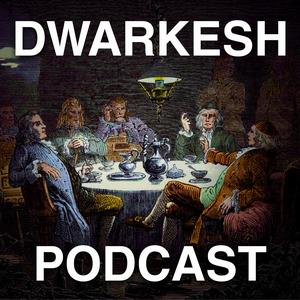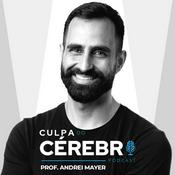117 episódios
- Dario Amodei thinks we are just a few years away from AGI — or as he puts it, from having “a country of geniuses in a data center”. In this episode, we discuss what to make of the scaling hypothesis in the current RL regime, why task-specific RL might lead to generalization, and how AI will diffuse throughout the economy. We also dive into Anthropic’s revenue projections, compute commitments, path to profitability, and more.
Watch on YouTube; read the transcript.
Sponsors
* Labelbox can get you the RL tasks and environments you need. Their massive network of subject-matter experts ensures realism across domains, and their in-house tooling lets them continuously tweak task difficulty to optimize learning. Reach out at labelbox.com/dwarkesh.
* Jane Street sent me another puzzle… this time, they’ve trained backdoors into 3 different language models — they want you to find the triggers. Jane Street isn’t even sure this is possible, but they’ve set aside $50,000 for the best attempts and write-ups. They’re accepting submissions until April 1st at janestreet.com/dwarkesh.
* Mercury’s personal accounts make it easy to share finances with a partner, a roommate… or OpenClaw. Last week, I wanted to try OpenClaw for myself, so I used Mercury to spin up a virtual debit card with a small spend limit, and then I let my agent loose. No matter your use case, apply at mercury.com/personal-banking.
Timestamps
(00:00:00) - What exactly are we scaling?
(00:12:36) - Is diffusion cope?
(00:29:42) - Is continual learning necessary?
(00:46:20) - If AGI is imminent, why not buy more compute?
(00:58:49) - How will AI labs actually make profit?
(01:31:19) - Will regulations destroy the boons of AGI?
(01:47:41) - Why can’t China and America both have a country of geniuses in a datacenter?
Get full access to Dwarkesh Podcast at www.dwarkesh.com/subscribe - In this episode, John and I got to do a real deep-dive with Elon. We discuss the economics of orbital data centers, the difficulties of scaling power on Earth, what it would take to manufacture humanoids at high-volume in America, xAI’s business and alignment plans, DOGE, and much more.
Watch on YouTube; read the transcript.
Sponsors
* Mercury just started offering personal banking! I’m already banking with Mercury for business purposes, so getting to bank with them for my personal life makes everything so much simpler. Apply now at mercury.com/personal-banking
* Jane Street sent me a new puzzle last week: they trained a neural net, shuffled all 96 layers, and asked me to put them back in order. I tried but… I didn’t quite nail it. If you’re curious, or if you think you can do better, you should take a stab at janestreet.com/dwarkesh
* Labelbox can get you robotics and RL data at scale. Labelbox starts by helping you define your ideal data distribution, and then their massive Alignerr network collects frontier-grade data that you can use to train your models. Learn more at labelbox.com/dwarkesh
Timestamps
(00:00:00) - Orbital data centers
(00:36:46) - Grok and alignment
(00:59:56) - xAI’s business plan
(01:17:21) - Optimus and humanoid manufacturing
(01:30:22) - Does China win by default?
(01:44:16) - Lessons from running SpaceX
(02:20:08) - DOGE
(02:38:28) - TeraFab
Get full access to Dwarkesh Podcast at www.dwarkesh.com/subscribe - Adam Marblestone is CEO of Convergent Research. He’s had a very interesting past life: he was a research scientist at Google Deepmind on their neuroscience team and has worked on everything from brain-computer interfaces to quantum computing to nanotech and even formal mathematics.
In this episode, we discuss how the brain learns so much from so little, what the AI field can learn from neuroscience, and the answer to Ilya’s question: how does the genome encode abstract reward functions? Turns out, they’re all the same question.
Watch on YouTube; read the transcript.
Sponsors
* Gemini 3 Pro recently helped me run an experiment to test multi-agent scaling: basically, if you have a fixed budget of compute, what is the optimal way to split it up across agents? Gemini was my colleague throughout the process — honestly, I couldn’t have investigated this question without it. Try Gemini 3 Pro today gemini.google.com
* Labelbox helps you train agents to do economically-valuable, real-world tasks. Labelbox’s network of subject-matter experts ensures you get hyper-realistic RL environments, and their custom tooling lets you generate the highest-quality training data possible from those environments. Learn more at labelbox.com/dwarkesh
To sponsor a future episode, visit dwarkesh.com/advertise.
Timestamps
(00:00:00) – The brain’s secret sauce is the reward functions, not the architecture
(00:22:20) – Amortized inference and what the genome actually stores
(00:42:42) – Model-based vs model-free RL in the brain
(00:50:31) – Is biological hardware a limitation or an advantage?
(01:03:59) – Why a map of the human brain is important
(01:23:28) – What value will automating math have?
(01:38:18) – Architecture of the brain
Further reading
Intro to Brain-Like-AGI Safety - Steven Byrnes’s theory of the learning vs steering subsystem; referenced throughout the episode.
A Brief History of Intelligence - Great book by Max Bennett on connections between neuroscience and AI
Adam’s blog, and Convergent Research’s blog on essential technologies.
A Tutorial on Energy-Based Learning by Yann LeCun
What Does It Mean to Understand a Neural Network? - Kording & Lillicrap
E11 Bio and their brain connectomics approach
Sam Gershman on what dopamine is doing in the brain
Gwern’s proposal on training models on the brain’s hidden states
Get full access to Dwarkesh Podcast at www.dwarkesh.com/subscribe - Read the essay here.
Timestamps
00:00:00 What are we scaling?
00:03:11 The value of human labor
00:05:04 Economic diffusion lag is cope00:06:34 Goal-post shifting is justified
00:08:23 RL scaling
00:09:18 Broadly deployed intelligence explosion
Get full access to Dwarkesh Podcast at www.dwarkesh.com/subscribe - This is the final episode of the Sarah Paine lecture series, and it’s probably my favorite one. Sarah gives a “tour of the arguments” on what ultimately led to the Soviet Union’s collapse, diving into the role of the US, the Sino-Soviet border conflict, the oil bust, ethnic rebellions and even the Roman Catholic Church. As she points out, this is all particularly interesting as we find ourselves potentially at the beginning of another Cold War.
As we wrap up this lecture series, I want to take a moment to thank Sarah for doing this with me. It has been such a pleasure.
If you want more of her scholarship, I highly recommend checking out the books she’s written. You can find them here.
Watch on YouTube; read the transcript.
Sponsors
* Labelbox can get you the training data you need, no matter the domain. Their Alignerr network includes the STEM PhDs and coding experts you’d expect, but it also has experienced cinematographers and talented voice actors to help train frontier video and audio models. Learn more at labelbox.com/dwarkesh.
* Sardine doesn’t just assess customer risk for banking & retail. Their AI risk management platform is also extremely good at detecting fraudulent job applications, which I’ve found useful for my own hiring process. If you need help with hiring risk—or any other type of fraud prevention—go to sardine.ai/dwarkesh.
* Gemini’s Nano Banana Pro helped us make many of the visuals in this episode. For example, we used it to turn dense tables into clear charts so that’d it be easier to quickly understand the trends that Sarah discusses. You can try Nano Banana Pro now in the Gemini app. Go to gemini.google.com.
Timestamps
(00:00:00) – Did Reagan single-handedly win the Cold War?
(00:15:53) – Eastern Bloc uprisings & oil crisis
(00:30:37) – Gorbachev’s mistakes
(00:37:33) – German unification and NATO expansion
(00:48:31) – The Gulf War and the Cold War endgame
(00:56:10) – How central planning survived so long
(01:14:46) – Sarah’s life in the USSR in 1988
Get full access to Dwarkesh Podcast at www.dwarkesh.com/subscribe
Mais podcasts de Ciência
Podcasts em tendência em Ciência
Sobre Dwarkesh Podcast
Deeply researched interviews www.dwarkesh.com
Sítio Web de podcastOuve Dwarkesh Podcast, Science Weekly e muitos outros podcasts de todo o mundo com a aplicação radio.pt

Obtenha a aplicação gratuita radio.pt
- Guardar rádios e podcasts favoritos
- Transmissão via Wi-Fi ou Bluetooth
- Carplay & Android Audo compatìvel
- E ainda mais funções
Obtenha a aplicação gratuita radio.pt
- Guardar rádios e podcasts favoritos
- Transmissão via Wi-Fi ou Bluetooth
- Carplay & Android Audo compatìvel
- E ainda mais funções


Dwarkesh Podcast
Leia o código,
descarregue a aplicação,
ouça.
descarregue a aplicação,
ouça.
































